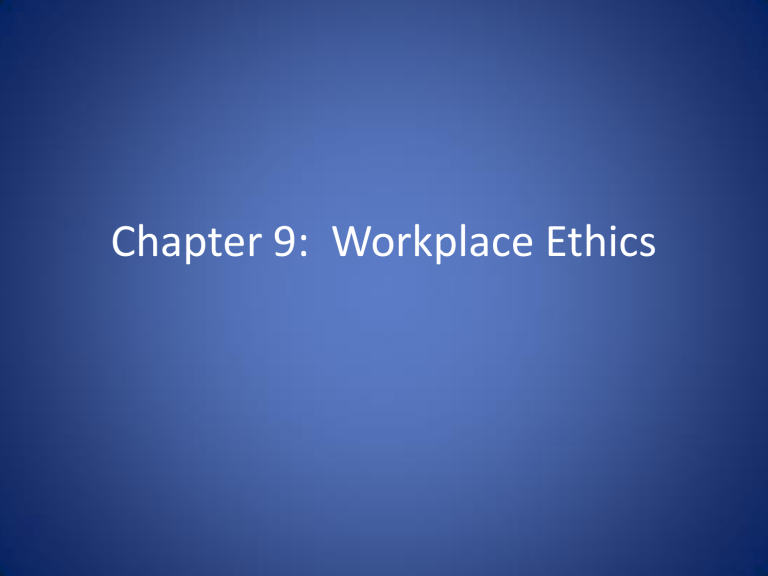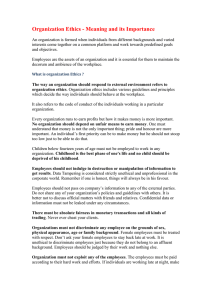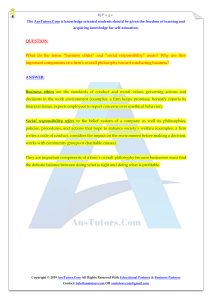
Chapter 9: Workplace Ethics 9.1-Desirable Employee Qualities • Objectives: – Identify the skills and personal qualities employers look for in employees – Describe ways to demonstrate desirable personal qualities on the job. What do Employers want? • “We look for someone capable of doing lost of things well, and more importantly, someone who fits into the organization’s structure.” – Raymond Brixey, former director of human resources for the Quaker Oats Company • Master a wide range of personal and academic skills – Solid thinking skills, math skills, communication skills, and strong personal qualities Cooperativeness • One of employee’s most valued qualities • Willingness to work well with others to reach a common goal • Closely linked to listening skills, responsibility, and self-management • How can you be cooperative? – _______ • How can you be cooperative? – Perform tasks you do not like without complaining or trying to avoid them – Do your fair share of a job when working with others. – Volunteer to help coworkers meet deadlines or reach goals Willingness to follow Directions • Requires listening skills • Follow these suggestions: – Stop what you are doing, and listen to the directions you are being given – Listen carefully, even if you think you already know – Take notes, if possible – Identify the goal, or purpose, of the task – If you do not understand the directions, ask questions rather than guessing Willingness to Learn • • • • Do not pretend to know something Ask questions Be willing to learn any task or procedure Look for opportunities to get more training Initiative • Means doing what needs to be done without being told • Examples? Willingness to take responsibility • Responsibility is the willingness to accept an obligation and to be accountable for an action or situation • What do you get out of taking on more responsibility? – Your job becomes more interesting – You gain experience – Chance for a promotion – You increase your value to the company Self-management • Means doing the things necessary to build the career you want • Tips: – Set career goals and develop a plan for reaching them – Monitor your work habits and performance – Ask your supervisors for feedback Be a Self-Manager • • • • • • • Ambitious Businesslike Competent Conscientious Cooperative Enthusiastic Trustworthy • • • • • • • Imaginative Industrious Punctual Productive Teachable Thorough versatile Loyalty • Be loyal to your company • How do you show loyalty at work? – Be positive – Look for solutions – Express critical comments only to your manager in private – Pitch in to help your company and coworkers • Working overtime, staying late without pay, learn new tasks • A trait that is appreciated by employers Just Draw It! • Draw a cartoon character of the ‘perfect’ employee – Identify 5 characters traits that would be a ‘perfect’ employee 9.2-Ethical Behavior • Objectives: – Explain the importance of ethics in the workplace – Identify ethical principles and ways to apply them in a work setting – Describe strategies for handling unethical practices What are Ethics? • The principles of conduct that govern a group or society – How crucial are ethics in the workplace? – Is it important for employees to behave ethically toward one another? Toward their company? • Having a code of ethics will help you choose the right course of action Honesty • What is the penalty for dishonesty? – Your reputation? • How much does your reputation matter? • About work hours – Employees are trusted to work the hours they say they will work – What might be the consequence if employees are dishonest about their hours? • Honesty about money – Taking money out of the cash drawer is dishonest • Respecting employers’ property – Do not take office supplies home for your personal use – Do not use company property for personal use without permission – Do not illegally copy company software for your personal use –? Interacting with Others • Confidentiality – Not talking about company business with other people – Sometimes legal documents signed, sometimes it is just expected • Fairness – Treat everyone you encounter fairly, openly, and honestly – Prejudice is a negative attitude toward a person or group • Racism, sexist comments, stereotyping, name-calling, and generalizations • Hurtful, offensive, and unacceptable • Employees may be disciplined or fired • Companies or organizations can face legal action Handling Unethical Practices • What should you do if you are the victim of unethical practices? • What if you experience prejudice in the workplace? • What if you observe unethical business practices? • Consider the incident – Was it one time or is it ongoing practice? – Can the matter be cleared by a calm, open discussion? • If the offense is deliberate, do not ignore it – Consider your options • Walk away • Report the incident to your supervisor • Tell him/her you will not tolerate prejudice/unethical behavior • What if your employer is unethical? – Choose to live with the situation – Keep quiet and find another job – Report it to the appropriate authority • Keep a written record/describe the incident/record the date and time • Check your observations with others you trust • Get advice from people you trust • Check your motives • Collect evidence • Decide to remain anonymous or to speak openly • Report only facts or observations


